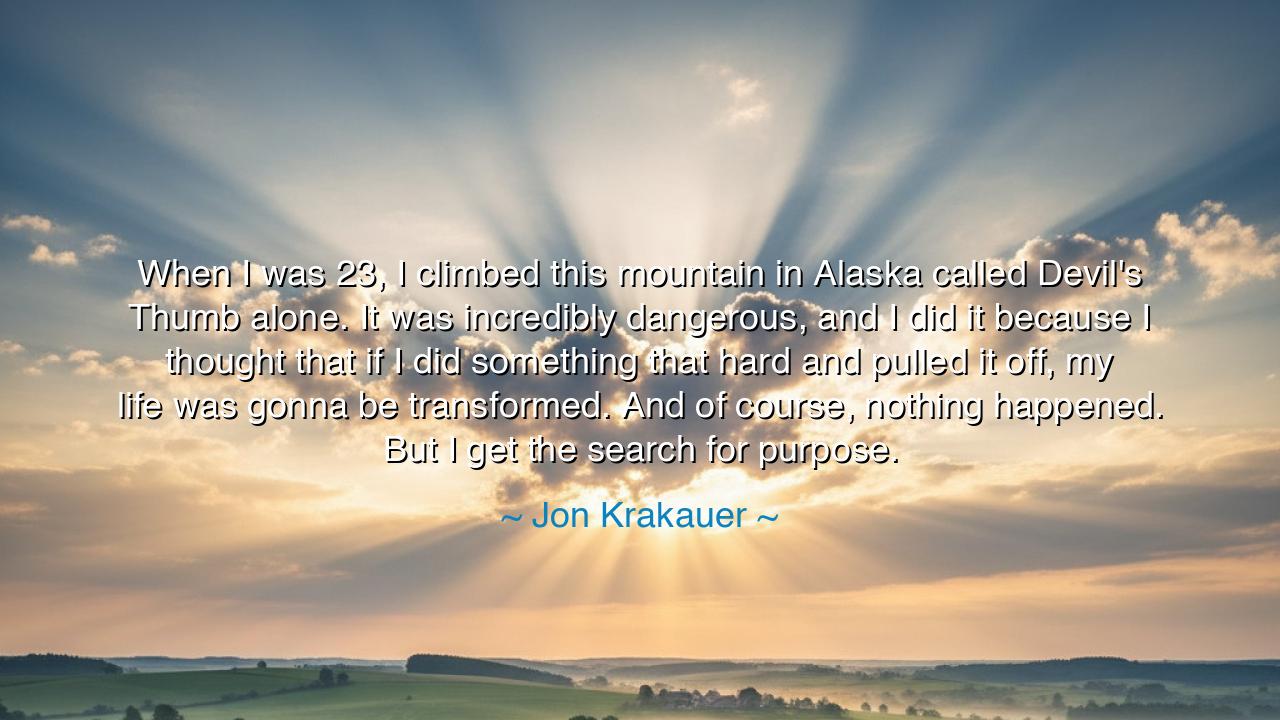
When I was 23, I climbed this mountain in Alaska called Devil's
When I was 23, I climbed this mountain in Alaska called Devil's Thumb alone. It was incredibly dangerous, and I did it because I thought that if I did something that hard and pulled it off, my life was gonna be transformed. And of course, nothing happened. But I get the search for purpose.






When Jon Krakauer reflected, “When I was 23, I climbed this mountain in Alaska called Devil’s Thumb alone. It was incredibly dangerous, and I did it because I thought that if I did something that hard and pulled it off, my life was gonna be transformed. And of course, nothing happened. But I get the search for purpose,” he was not merely recounting an adventure; he was unveiling the eternal drama of the human soul — the longing to prove one’s existence through trial. His words are the confession of a wanderer who sought meaning in struggle, who believed that by confronting the impossible, he could be reborn. Yet what he found atop the mountain was not revelation, but silence. And in that silence lay the deeper truth — that purpose does not descend upon us from achievement, but must be forged within the quiet furnace of the heart.
Krakauer’s journey to Devil’s Thumb, one of Alaska’s most perilous peaks, was a battle between life and death — not for glory, but for identity. Like many in youth, he was haunted by the thought that life should be extraordinary, that only through danger and endurance could he discover who he truly was. Alone upon the frozen face of the mountain, he risked everything for transcendence. And yet, when he reached the summit, the heavens did not open, the universe did not whisper its secrets. The same man who began the climb stood upon that summit — exhausted, trembling, but unchanged. It was a moment of revelation disguised as disappointment: that struggle itself is the meaning, not the transformation it promises.
This longing — to find the self through suffering — has burned in every age. Odysseus, after years of war and wandering, returned home to Ithaca not as the conqueror of Troy but as a man weary and wise, knowing that the journey, not the destination, is what shapes the soul. So too, Siddhartha, who abandoned his palace and wandered in the dust, discovered after years of asceticism that enlightenment is not found through torment, but through understanding. The mountain, the sea, the desert — these are not ends in themselves, but mirrors that reflect the pilgrim’s own heart. Krakauer’s Devil’s Thumb stands among these sacred places, a modern altar to the timeless search for meaning through ordeal.
In his own life and in his later writings — especially in Into the Wild, the story of Chris McCandless, another seeker lost in Alaska’s wild — Krakauer revealed the shared hunger of all who yearn for purpose in a world that often feels hollow. McCandless sought purity in isolation, believing nature would cleanse his spirit; Krakauer sought redemption through achievement, believing danger would ignite it. Both discovered that the wilderness, though vast and beautiful, is not a teacher that gives answers. It only strips away illusions, leaving the soul face to face with itself. The lesson is ancient and humbling: no mountain can transform us if we do not first transform within.
Yet there is greatness even in this disillusionment. For though Krakauer found no grand revelation atop Devil’s Thumb, he gained something rarer — clarity. He learned that the quest for purpose is itself the thread that weaves meaning into life. The struggle, the endurance, the courage to seek — these are the marks of a spirit alive. It is not the summit that changes us, but the climb: the hunger that drives us forward, the fear we overcome, the solitude that teaches us to listen. In that striving, we become more real, more awake, more human.
There is a quiet heroism in acknowledging that the world offers no instant revelation. The ancients called this acceptance sophrosyne — the balance of the soul, the wisdom to live between extremes. To seek greatness, but not be enslaved by it; to dream of transformation, yet find peace in small victories. The man who learns this walks with humility, knowing that purpose is not a prize to be seized but a flame to be tended daily — in work, in love, in the service of others.
So, my children, take this truth from Krakauer’s frozen ascent: do not wait for the mountaintop to make you whole. The heights you seek will not reveal who you are — they will only test what you already carry. Walk your own mountain with courage, yes, but remember to look inward as you climb. The journey’s meaning is not in the summit, but in the step, in the breath, in the act of striving itself. And when you find, as Krakauer did, that the world offers no thunderous revelation, do not despair. For in that silence, the true voice of purpose begins to speak — not from the heavens, but from the still, enduring heart within you.






AAdministratorAdministrator
Welcome, honored guests. Please leave a comment, we will respond soon